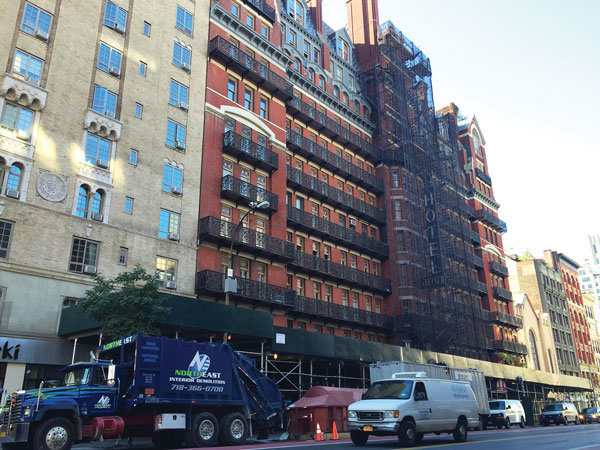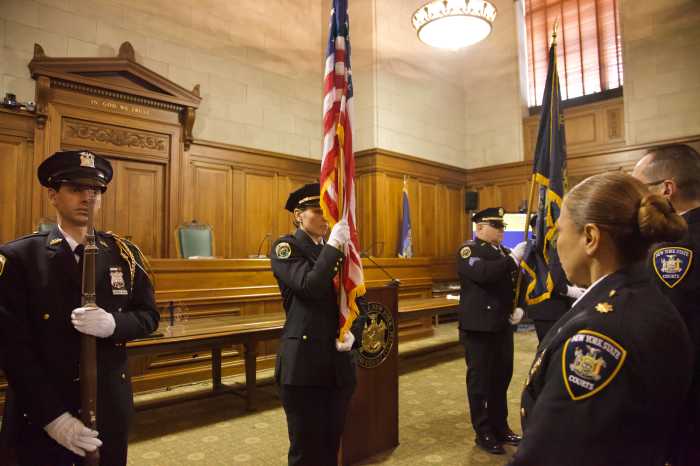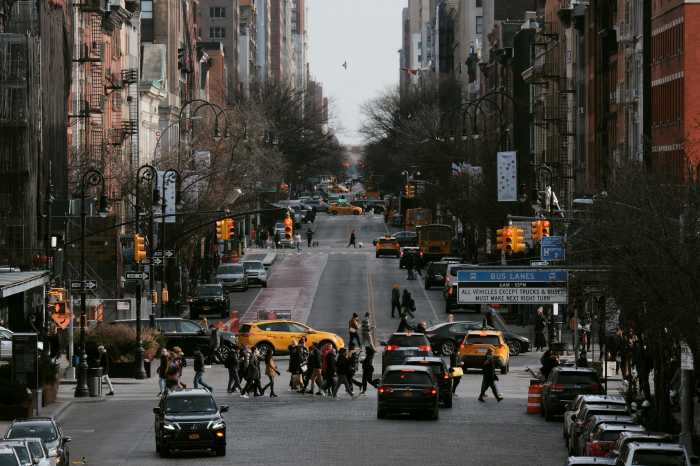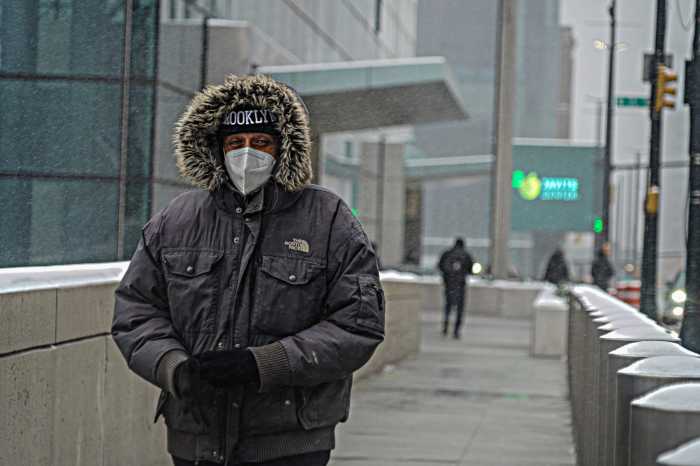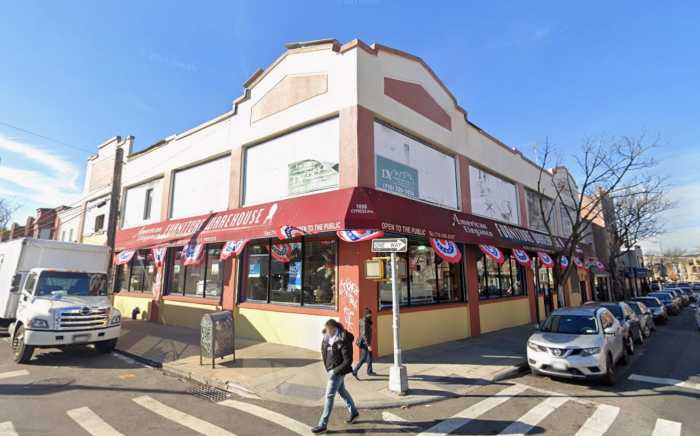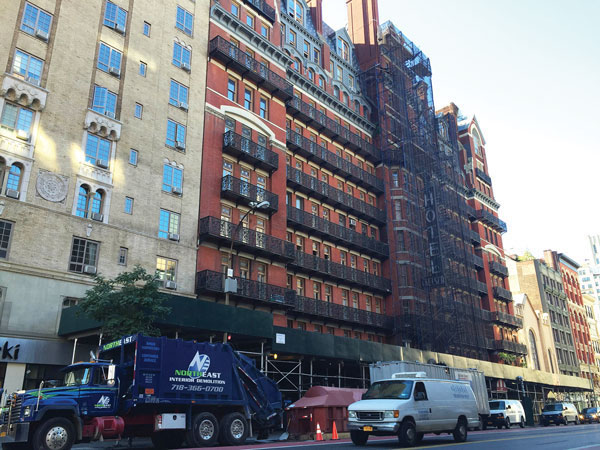
BY DENNIS LYNCH | Home to a handful who’ve lived there for decades, and a daily draw for tourists lured by its bohemian past and, the iconic Chelsea Hotel has changed hands once again — this time, for $250 million. The new owners plan to renovate the building and reopen it as a hotel and condominium by 2018, which their predecessors planned to do when they bought the property in 2013.
The group of buyers, who purchased the storied hotel and residence under the name SIR Chelsea LLC, includes Richard Born and Ira Drukier of BD Hotels and hotelier Sean MacPherson. They first became involved at the Chelsea Hotel (222 W. 23rd St., btw. Seventh & Eighth Aves.) in February, and took over renovations in July.
The partners have a history of successfully restoring boutique hotels, including the Bowery, Greenwich, Marlton, and Maritime hotels in Manhattan (some of which feature condominiums). They plan to build 25,000 square feet of condo space at the Chelsea, although it is unclear how that will be spread in the hotel, which has been renovated, gutted, and “butchered” by previous owners throughout its 131 years, according to Zoe Pappas, the president of the Chelsea Hotel Tenant Association.
She met Born, Drukier, and MacPherson in February, and is optimistic that they will do right by the 50 or so long-term tenants — the Chelsea Hotel’s last real connection to its past as the home of some of most important creative minds of the 20th century — and finally finish the renovation process many tenants want to put behind them.
“Ira Drukier is very experienced in construction and he’s taking it head on — he is coming to the site almost every day; he knows what is happening,” Pappas said. “In our experience that’s a success when they’re here controlling what’s going on.”
Drukier’s partner, Born, said the group was “still in the process of evaluating and planning for the Chelsea,” and that it was “premature” to comment on the breakdown of space and prospective prices.
It is unclear what will happen to the dozens of rent-stabilized apartments in the hotel as current residents move out or pass away. State law allows tenants in rent-stabilized apartments to hand off their apartments to a family member so long as that successor has been living in the apartment for at least two years before the tenant leaves or dies.
Some Chelsea Hotel tenants have young or adult children that could take over their apartments at rent-stabilized prices, Pappas said. The owners indicated to her they would like to keep some of the apartments in the Chelsea Hotel as such.
Born did not comment on the outstanding Department of Buildings (DOB) violations on the property, which include a Stop Work Order to halt demolition on the eighth and 12th floors for a failure to properly protect tenants. Born called the orders an “insignificant speed bump,” and that “maybe two or three tenants” were still having issues, in a comment to the Real Deal.
Pappas and other tenants corroborated that the issues were mostly with a small group of tenants. They alluded that a few tenants actively sought to slow down renovations and cause issues for the owners at the property.
Problems arose at the Chelsea Hotel, and the hotel board ousted longtime manager Stanley Bard in 2007. Bard’s family had run the hotel for much of the 20th century and were extremely accommodating to the struggling artists that set up shop there.
That changed immediately after he left — the board and its managers handed out eviction notices and reportedly tried to intimidate tenants to leave. They sold the hotel to developer Joe Chetrit in 2011, who tenants sued for using similar tactics, including shutting down water and electricity to their apartments.
“He used to turn off the elevator and water; he wanted us out,” said 39-year resident (and Chelsea Now contributor) Gerald Busby. “We were rats in the walls for all he was concerned.”
The hotel company King & Grove bought out Chetrit in 2013 and changed tack. They decided to cooperate with the tenants in the association, and later that year they agreed to 4.7 months free rent, a 20% reduction in rent until they completed construction (increased to a 35% reduction earlier this year), complete interior renovations of tenants’ apartments, free rooming at other King & Grove hotels during those renovations, and even a $60-per-day meal allowance.
But the renovation slowed, costing the development team mounds of cash. The developers hired a broker to help refinance the debt, take out more loans, and find another partner in 2015, according to the Wall Street Journal. King & Grove sold its share earlier this year.
The drawn-out ordeal has made some tenants instinctively cautious about any and everything going forward, according to one longtime tenant. First floor resident Judith Childs said some tenants are still in court with the previous owners and there was “no question that nerves are still on edge.” She is “perfectly well-satisfied” with her experience with the SIR Chelsea team and didn’t want to rove towards conjecture.
“They have their hands full, we’re here — that’s a fait accompli,” she said. “The better they do, the sooner they get things fixed, the sooner we’re out of their hair. They’re real estate developers, not angels, but I’m not going to speculate about what they might do.”
What they certainly will have to do is clear those violations with the city. There are 22 open DOB Environmental Control Board violations on the Chelsea Hotel dating from 2010 through last month, including 15 “immediately hazardous” violations, according to the DOB. Violations include inadequate fittings on gas lines leading to meters, a failure to safeguard an open elevator shaftway, and a handful of others for improper elevator work.



